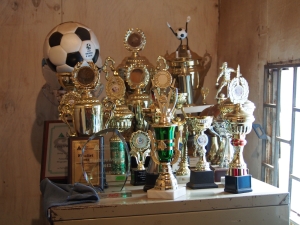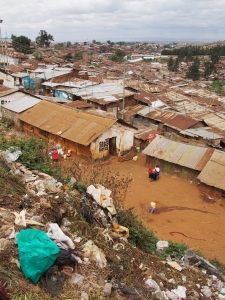Memories are made for sharing
Online learning through Coursera includes this course on the meaning of memories, using films as illustration. https://www.coursera.org/learn/memory-and-movies
Online learning through Coursera includes this course on the meaning of memories, using films as illustration. https://www.coursera.org/learn/memory-and-movies
Imagine you are the deputy head of a girls’ soccer academy. It’s a small school, around 150 pupils aged between 14 and 18. You have a regular teaching assignment, teaching science. Right now you are standing in front of a class of eager students all waiting to learn. Each one has a Kindle with all their text books downloaded on to it, a pen and a notebook for recording their notes in neat handwriting. You know that those Kindles are treasured and none will be lost or damaged. Each girl is proud to wear her school uniform with the logo “Education is the key to our future”. Each one is different, they all have their own personalities. Some are members of the school soccer team that has won so many trophies you only have room for a quarter of them to remain on display. You know that if you ask the class who wants to set up in their own business when they finish school nearly every girl will put up her hand. You also know you’ll get a range of answers as to the type of business they want to go into. One wants her own butchery business, another wants to go into wholesale, while yet another wants to go into the beauty profession and one wants to be a psychologist. Most want to continue their education post 18 and go on to college or university. Some would like to come back and teach here. Working with children with such ambitions and love of school and learning makes your job your joy. You’re delighted that the school is growing and that this year the school has had its first intake of boys. The school is popular – two hundred children applied for the 70 places available for the last intake.
With so many reasons to enjoy your work you become more determined to overcome the stresses.
You see the girls smiling faces. You don’t see the ragged sleeves of their jumpers, the frequently repaired skirts and blouses, the shoes that are down at heel and with the broken straps. You don’t see that the old and tiny wooden desks are crammed in tight to all four walls of the classroom with barely room to move a chair and just enough room for you to stand beside the door. You don’t see the rough walls that haven’t been painted since Barclays Bank sent over a team for a “do good day” several years ago. You don’t see the mud courtyard and path that runs around the school, with an open rivulet of water and raw sewage running through it, clogged up with plastic and other rubbish. You don’t smell the stench of garbage that pervades the air all around. You don’t mind that you don’t get paid while your teaching colleagues get on average 25% of the national wage for a teacher. You don’t mind because in return for being house mother and house father to a dorm of ten students whose parents can’t afford to keep them at home, you have a roof over your head and you are able to join in with the free school meals.

 When you are not teaching you are talking to sponsors and potential sponsors, finding little bits of money here and there for the things your students and the school need. Some more school uniforms for the students who would not be able to come to school otherwise as their family cannot afford to buy their uniform; the money to pay for the free school meals for everyone otherwise they would almost certainly go without; sanitary towels for the girls so they don’t have to pay for them with free sex to the boys who offer to buy them on their behalf. And that’s before you even think about buying supplies for the science room or some extra books, novels and general fiction, for the school library.
When you are not teaching you are talking to sponsors and potential sponsors, finding little bits of money here and there for the things your students and the school need. Some more school uniforms for the students who would not be able to come to school otherwise as their family cannot afford to buy their uniform; the money to pay for the free school meals for everyone otherwise they would almost certainly go without; sanitary towels for the girls so they don’t have to pay for them with free sex to the boys who offer to buy them on their behalf. And that’s before you even think about buying supplies for the science room or some extra books, novels and general fiction, for the school library.
Some of your sponsors are bigger than others – such as the company that provided the Kindles. This means you can pass on your old text books to another school that needs them and free up some more space for another classroom. Another sponsor wanted you to offer places for boys as well as girls and provided you with funds for another building. Right now you are campaigning to raise funds to build a new school-house, the old buildings to be converted into a dormitory so that more of the children can stay at the school all week and make better use of the facilities there.
True to what the school teaches about developing business for independence, you are also involved in supporting a photography and film company, Shedders, run by the school, which helps ‘shed’ light on the reality of life living in a slum and brings in some welcome income from some quite prestigious contracts. You are overseeing the setting up a new internet café where you will also offer photocopying and passport photos. You help manage the micro-finance scheme that enables your former students and the families of your students to set up in business themselves.
As well as the very successful soccer team the school has a successful drama club that tackles the issues of discrimination, poverty, health problems such as HIV/AIDS, politics and religion that are relevant in their community. The debating club tackle many of the same issues as they take on thorny subjects such as as school dropout, early marriage and domestic violence. The science club recently learned how to make solar power light bulbs and turned their experience into an income generating opportunity.
The school where you work is more than just a school, it is a community resource. It’s the Kibera Girls Soccer Academy which was founded in 2006 with the philosophy of ‘working against extreme gender inequalities because we know that by educating girls, there is a power ripple effect through the larger community and future generations of leaders’.
 As it name suggests the school is based in Kibera, a district in Nairobi, Kenya. Kibera is the second largest slum in the world and the largest slum in Africa. In an area of 1.5 square miles live over a million people. That’s 60% of the population of Nairobi living on 5% of the land. Half the population of the Kibera are children and young people under the age of 18. Although the Kenyan government own the land they have deemed Kibera an illegal settlement. This allows them to refuse to recognise the slum and abandon all responsibility for the area and the people in it. Just a short drive away are the homes of the wealthy, with Range Rovers and other luxury cars turning up at the Westernised shopping malls. The slum butts up close to the French Embassy.
As it name suggests the school is based in Kibera, a district in Nairobi, Kenya. Kibera is the second largest slum in the world and the largest slum in Africa. In an area of 1.5 square miles live over a million people. That’s 60% of the population of Nairobi living on 5% of the land. Half the population of the Kibera are children and young people under the age of 18. Although the Kenyan government own the land they have deemed Kibera an illegal settlement. This allows them to refuse to recognise the slum and abandon all responsibility for the area and the people in it. Just a short drive away are the homes of the wealthy, with Range Rovers and other luxury cars turning up at the Westernised shopping malls. The slum butts up close to the French Embassy.
Open sewers run through the streets. Many of the people there live on a $1US a day. Their first priorities are food and shelter. The rubbish piles up against their houses and fences, or clogs the trickling river that runs through the district and is fed by the open sewers. Refuse collection trucks could not get through the streets, and anyway the people cannot afford to pay for their refuse to be collected and taken away by the private refuse collection companies. Instead it piles up to become the rotting home of rats and mice; the children play amongst it and the goats nibble at the corn husks and whatever other tasty morsels they can find. When the rains come there is flooding and then cholera and typhus claim their dues from among the population. There are few toilets and no private washrooms. Fifty houses might share one latrine – with an average of eight people living in a house that’s one latrine to 400 people. Flying toilets fill in the gaps (sh*t on a leaf or old plastic bag, wrap it up and throw it over the fence). Where public latrines exist, set up by private enterprises that charge for their use, the effluence joins the rubbish in running in rivulets down the streets. With standing and slow moving water, breeding grounds for mosquitoes, malaria is a very real risk. Malaria prevention is undertaken through the use of mosquito nets but there are no clinics or hospitals in Kibera and the only treatment available is for those who can pay to visit the doctors beyond the boundaries. Some die. TB and other chest infections, urban dengue and yellow fever cause more health problems. Cars, let alone ambulances and fire trucks cannot get through many of the narrow streets, and probably wouldn’t bother to come here anyway. The sick have to be taken out in a wheelbarrow or carried by their family on a home-made stretcher. The good news is that HIV/AIDS is receding as a problem through the successes of health education programmes. Few people own bicycles or motorcycles. Most people walk. For longer journeys out of the Kibera there is the bus. An unguarded train track passes through Kibera, running from Mobassa in the south right through to Uganda. People walk along the track all the time.
Unlike recent refugee camps Kibera is a mature community and doesn’t make the news. Despite the problems it is a thriving community. The streets are crowded with small businesses, tiny little shops selling household goods, furniture, meat, vegetables, clothing, toiletries, and charcoal. Street vendors cook corn or other local foods and sell to passers by. In between are internet cafés, hairdressers or barbers, and cafés. All the normal shops and business you might expect to find in any shopping centre or town centre High Street. Except their buildings are built from mud or corrugated iron or old shipping containers. Around 20% of the people have electricity. Even though there is no waste removal and treatment service some homes receive fresh water supplies, which they sell to others for 5 Kenyan schilling for 20 litres (about £0.04 or $0.06). Earlier settlers here now own the homes that others rent. During the day the streets are mainly walked by children and goats. Early in the morning and by night the streets are crowded as the workers who travel out of the Kibera for work every day return home.
These are the condition your students live in. The children are your future and the girls from the Kibera Girls’ Soccer Academy will have the opportunity to use the education your are offering as a means to escape the slum. Some may choose to return to help others escape, just like you and many of your teaching colleagues have chosen to do.
There was a time when the JobCentre was there to help people find jobs. When I went into my local JobCentre in the summer of 2012 to inquire about work opportunities I was pointed towards a computer terminal and told to get on with it. It was made clear this was normal practice, no additional help normally available.
The blog from Beastrabban\’s Weblog below shows comments on a Guardian report from 2011 about the practices of JobCentres. My experience from 2012 and since suggests not a lot has changed.
In my recent voluntary work in the autumn of 2013 I worked with people who are terrified of being sanctioned because they have not met JobCentre demands to apply online for a specified number of jobs every day or every week. Some of these applications often have to be made online via a specific website the JobCentre can access to track claimants’ activity. The website is cumbersome to use and prone to faults. It doesn’t matter if the claimant has never used a computer before, or even if they know how to turn a computer on let alone access the internet, let alone cope with clunky inadequate jobsearch websites. It doesn’t matter that many online applications can take an hour to complete for even the most competent computer user. They still have to achieve the target of job applications using a system with which they are either unfamiliar or not confident. There is no support or sympathy from the JobCentre. Instead the claimants are expected to enlist the help of friends or family who are more familiar with computers and the internet if that’s possible, or find their way to public internet cafes (where these still exist and can become quite expensive); or the alternative option of using UK Online Centres which are usually most easily found in libraries where they are over-subscribed and time limited to an hour (not enough to fill in a job application with ASDA which takes an hour and a half for someone experienced at using the internet – I tried it) and with only the minimum of help and advice available. In larger towns the voluntary sector is filling in the gap with UK Online provisions but funding is poor and dependent on volunteers, many of whom themselves are there because they need the work experience to keep the JobCentre happy.
Meanwhile a whole industry has been created out of this situation. Private agencies who are publicly funded provide work related training, the better ones having offices where clients can access the internet for job searches.
But the greatest damage is in the stress caused by fear of sanctions. In some people their stress levels have become so high it has blocked their capacity to learn even the simplest of things.
Stress can do that. It can block the ability to learn. I’ve been there myself, in a particularly stressful work situation where I was conscious of the fact that while I could continue to function on a day to day basis I was completely incapable of learning from new experiences or even make the best use of ‘reflective’ learning.
I’ve also seen the effect in others when I worked with refugees from war torn countries: intelligent men (and sometimes women) whose terrible memories and experiences were so overpowering they struggled to learn new skills that would help them settle in their new environment (this effect was well known at the time but I will have to find the links to any further evidence and add it here later – in the meantime there is reference to the effect of stress on learning at http://www.trainingplace.com/source/stress.html).
Targets and sanctions are the tools of the neoliberal, capitalist, managerialist, society and work environment that has been created over the last couple of decades. But it’s not effective. The weakest and more vulnerable, the already disempowered, are the victims of this society we have created. And it’s time we spoke up about the effect this is having.
This is another video from the Guardian’s Youtube channel. It’s an expose of how the DWP has set targets to get people thrown off Jobseekers’ Allowance. These revelations are made by a whistleblower, whose face is naturally shadowed and voice disguised. He states that there is competition between departments and offices to have the most people thrown off benefits. According to the Jobcentre employee, the staff have two option available for getting someone off benefits: either find them a job, ‘which is really difficult’, or have them thrown off benefits ‘which is really easy’. He states that the DWP deliberately targets the young, because of their lack of maturity and experience, the under-educated, and those with problems reading and writing, such as sufferers from dyslexia. They will not try to remove the tough and experienced from the benefits system.
Mike over at Vox Political has described Atos and the Coalition…
View original post 310 more words